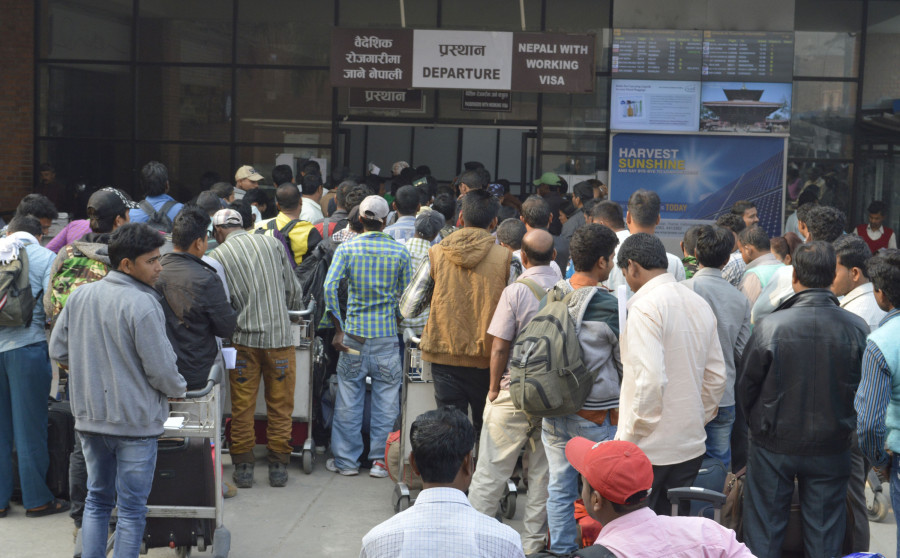National
Saudi Arabia to assess skills of migrant workers
Nepali workers can acquire skills and also demand better pay under the provision, labour migration experts say.
Chandan Kumar Mandal
Nepali migrant workers going to Saudi Arabia in the near future will have to go through a skill verification test before landing in the kingdom.
The kingdom has announced a scheme to assess the skills of the workers coming to the country to ensure they are qualified for their jobs in the country.
Earlier this month, the Ministry of Human Resources and Social Development announced the launch of the “Professional Verification” programme, which will examine all skilled workers in their home country before they arrive in Saudi Arabia.
Once enforced, the programme is going to impact the tens of thousands of Nepali migrant workers who migrate for opportunities in the kingdom’s various job sectors.
The kingdom hosts nearly 400,000 Nepalis who have been living and working there, as per the Nepal Labour Migration Report, 2020.
According to Swarna Kumar Jha, a labour migration expert, the scheme can have multifaceted and long-term benefits for Nepali workers and Nepal, as a source country sending out its labour force.
“We have seen that a majority of our outbound workers are unskilled. Although the government has been prioritising the sending of workers only after providing some skills, that has not happened,” said Jha, who is also a coordinator of the National Network for Safe Migration, a grouping of organisations promoting safer migration.
“Saudi Arabia enforcing such rules will make the Nepal government think of providing skills to Nepali migrants,” said Jha. “We might have sent unskilled workers so far. But if the destination countries like Saudi Arabia will demand skilled workers, then Nepal will be compelled to also produce and send skill workers.”
According to data from the Department of Foreign Employment, the occupational profile of Nepali migrants in the fiscal year 2018-19 shows that 59 percent of first-timer migrants took up unskilled jobs abroad. The number was even low for the fiscal year 2017-18, when 64 migrants had migrated without any skills.
Through the skill assessment programme, which will be enforced from July this year, the Saudi authorities aim to improve the quality of skilled workers entering the country, enhance their productivity, improve the services they provide and reduce the influx of unqualified workers, according to Arab News. The programme will verify that all the skilled workers in the kingdom have the skills required to perform their assigned jobs.
Foreign workers seeking employment opportunities in the kingdom’s private sector will be required to take exams based on their field of work to prove their skills and experience. For this, the local authorities have identified more than 1,000 professions in 23 areas as per the Saudi Standard Classification of Occupations.
With this programme, it is also expected to limit the inclusion of unskilled workers in the country’s labour market. Such limitations will limit Nepalis’ work opportunities in Saudi Arabia as only skilled workers will get jobs in the country.
However, labour migration experts say such provision might have immediate drawbacks but can yield benefits in future for Nepali workers.
“If other countries in the Gulf and Malaysia also make skill test compulsory then there will be a realisation among Nepali authorities that skills are must for foreign workers,” said Jha. “Although we might not be able to send a large number of workers immediately, which is already affected due to the Covid-19 pandemic, if we can produce skilled workers, then we can ensure a market for our workers even for future.”
The program will examine all skilled workers in their home country before their arrival in the Kingdom, in cooperation with selected international examination centres. Likewise, it will also assess existing skilled workers in the country. The move has been already praised by other labour sending countries.
According to Jha, sending skilled workers will also enhance Nepal’s bargaining capacity while negotiating with destination countries' governments.
“As unskilled workers do not get high salaries, sending skilled workers means Nepal can demand a handsome salary for workers with some skills. Also, having some sort of training makes these workers safe at the workplace,” said Jha. “When the host country itself examines workers’ skill level, it will be more transparent and credible.”
For several years, Saudi Arabia has remained one of the most preferred labour destinations for Nepalis. In 2017-18, 11.6 percent of Nepali youths reached Saudi Arabia, before seeing a surge the next year when 19.5 percent workers flew for jobs in the kingdom.
Demand for Nepali workers in Saudi Arabia, which had slumped in recent years, has once again seen a revival. With the reopening of Saudi Arabia for Nepali migrants, it is expected that tens of thousands of jobs will soon be available.
Recently, the kingdom also introduced labour reforms to protect the rights of foreign workers on its soil.
According to Jha, the provision will help workers not only while working in the country but also when they return home. Nepal’s reintegration scheme offers soft loans to those with a set of skills.
“Although the new provision may look complicated in the beginning, it is beneficial for workers. They can sharpen and upgrade their skills,” said Jha. “With upgraded skills, workers can demand higher remuneration. When they return home, they can do something on their own with the skills.”




 16.12°C Kathmandu
16.12°C Kathmandu















